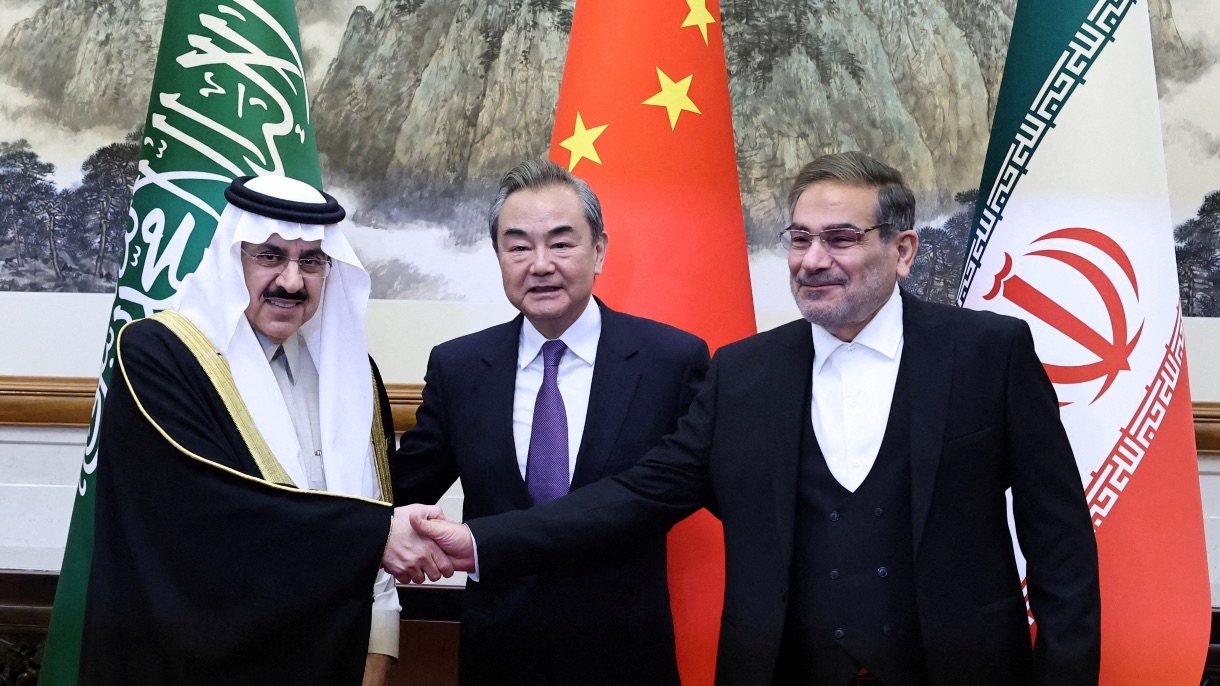Saudi-Iran deal shows how US sanctions strategy backfired, experts say

The deal between Saudi Arabia and Iran reached this month is the culmination of a years-long attempt at rapprochement, and has shown how the US strategy of sanctioning countries like Iran has backfired, experts said on Thursday.
In the deal signed earlier this month, the two countries agreed to reopen their embassies and missions on each other's soil within two months and committed to non-interference in each other's internal affairs, according to a joint statement issued with China.
The deal ended close to 10 years of no diplomatic relations after Saudi Arabia cut ties with Iran in 2016 over Iran's sharp criticism of Riyadh's order to execute Shia cleric, Nimr al-Nimr.
Kristian Coates Ulrichsen, a Middle East fellow at Rice University's Baker Institute for Public Policy, said that while the timing of the deal had come as a surprise, Riyadh and Tehran had been working towards reestablishing relations for several years now.
Ulrichsen said the motivation on the Saudi side had come as a result of a lesson learned following former US President Donald Trump's "maximum pressure" campaign, in which the US reinstated wide-ranging sanctions on Iran while also exiting the 2015 nuclear deal signed by Washington, Tehran, and world powers.
Stay informed with MEE's newsletters
Sign up to get the latest alerts, insights and analysis, starting with Turkey Unpacked
While Saudi Crown Prince Mohammed bin Salman had called on the US to assert more pressure on Iran, in 2019 the kingdom's oil facilities were attacked by a drone strike which was blamed on Tehran. The attack led to a 50 percent drop in Saudi oil production.
"Donald Trump said this was an attack on Saudi Arabia not on us. He was drawing a distinction between US interests and their interests," said Ulrichsen during an online webinar on Thursday hosted by the Arab Center Washington DC.
"You saw the Saudis suddenly realising that they had to adopt a set of policies that reflected their own interests," he added.
US needs to 'rethink approach'
For Iran, US sanctions had a more direct impact on Tehran's willingness to look for other outlets and paths outside the realm of the American financial system.
Since Washington reimposed sanctions on Iran, they have had a crippling effect on the economy, including steady inflation, devaluation of the Iranian rial, and a declining Global Domestic Product (GDP).
Days after the deal was announced, Saudi Arabia's finance minister said that Riyadh could begin investing in Iran "very quickly".
"[The deal] allows Iran to turn around to the West, to the US and its allies - and say: 'Look, ultimately you're never going to be able to isolate me in the way that you did prior to the nuclear deal'," Dina Esfandiary, a senior advisor for the Middle East and North Africa for the International Crisis Group, said during the online webinar.
The US dollar has dominated the international market for decades and has a major hold over international finance in both investing, funding, and trading.
Because of that dominance, the US has used a policy of sanctions against its adversaries, from launching an embargo of Cuba in 1962 and sanctioning the Saddam Hussein government in Iraq to imposing sanctions on Iran and Syria.
The latest country to face massive US sanctions is Russia, which was blacklisted by Washington following its invasion of Ukraine last year.
However, experts say that the policy of sanctions has proven ineffective, especially in recent years, as China has emerged as an equal rival to the US in the international financial market. Saudi Arabia, for example, reportedly was considering pricing some of its oil sales to China in yuans.
"I would advocate that it means that the United States has to rethink its approaches, particularly towards the use of economic sanctions, which I think are backfiring more and more," said Barbara Slavin, a distinguished fellow at the Stimson Center.
"We have to make sure we maintain ties with not only the countries in the region, but also with the Chinese to make sure that we are not putting ourselves in a situation where we are no longer capable of brokering agreements among adversaries."
Middle East Eye delivers independent and unrivalled coverage and analysis of the Middle East, North Africa and beyond. To learn more about republishing this content and the associated fees, please fill out this form. More about MEE can be found here.





